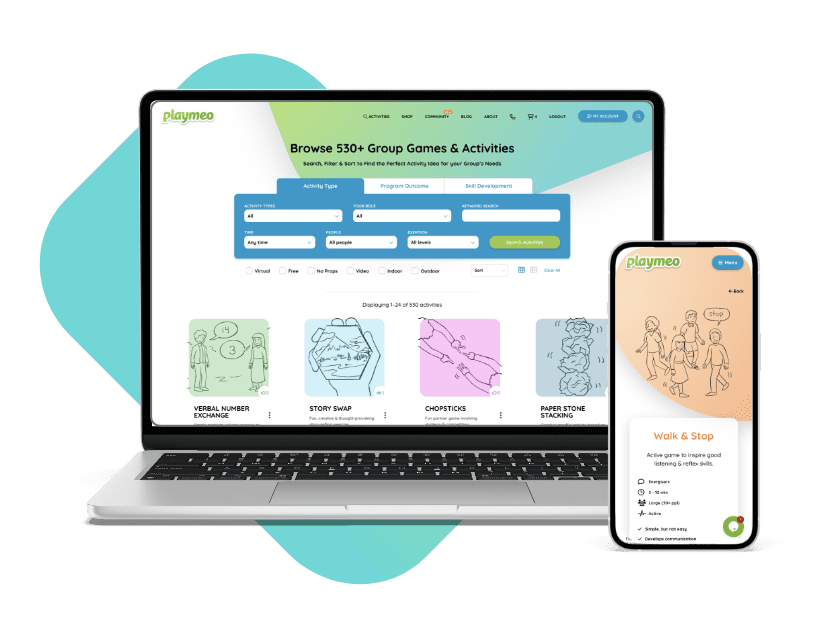When is the Best Time to Debrief or Reflect?
Welcome to the third instalment of our short series of video tutorials focused on processing, reflection or debriefing skills.
This week’s Facilitator Tips episode explores the question of when to debrief with your group.
<< Go to Episode 45 Go to Episode 47 >>
By definition, it would seem obvious that debriefing should occur at the conclusion of a group’s experience, but this may not necessarily be the best time.
This short video will broaden your understanding of this valuable facilitation skill.
Click the play button above to learn more about when to debrief with your group.
Want to join the conversation?
Please leave a comment at the bottom of the page (you must be logged in.)
Don’t have a playmeo account? Join today.
Useful Links & Resources
- Why Debrief – the first in our series of video tutorials focused on group processing skills.
- What To Debrief – the second in our series of video tutorials focused on group processing skills.
- How To Debrief – the fourth & final instalment of our series of video tutorials focused on group processing skills. Or in other words, this video will help you ask good debrief questions.
- Useful Debriefing Tips – a bunch of useful and practical tips to help you lead an effective reflection session with your group.
…EE
Video Transcript
Hi there folks and welcome to the Facilitator Tips video series.
My name is Mark Collard, I work as an experiential trainer and author, and today we want to focus on Episode 46, the third in our series of four episodes around one topic, processing, debriefing, or reflection. We’ve looked at why. We also looked at the what. And today we’re going to look at when. When do you debrief?
Now just by virtue of the definition of debrief, it suggests and it typically is at the end of an experience. That just makes sense, doesn’t it, that you want to be able to invite a group to have gone through an experience and then reflect back on it. So the typical response to this question is the end.
But I want to broaden your horizons here, because you also want to understand when is the end, like is it ten minutes from now, next week, is it next year. There can be lots of reasons why you choose to delay the reflection. So again you want to look back at the “what” topic in terms of significance and appropriateness as to exactly when at the end of the experience would you choose to process.
It can also be at the beginning which is one reason I choose to use the word “process” or “reflection” more often than “debrief”. Debrief by definition means at the end, but to reflect at the beginning can be a really powerful tool, to imagine your group thinking about what they’re about to move into, and then imagine if they could reflect on what’s about to happen, can they actually think about how that might change their actions, their thoughts, and their behaviours. So inviting them to reflect at the beginning is a really powerful tool, often referred to as frontloading.
And then, of course, there’s the middle. So you’ve got it at the end, you’ve got it at the beginning, and there are sometimes reasons to process in the middle. That is you might just simply ask your group to hey stop there, everyone there, stop, and sometimes just that alone can invite people to reflect back on I wonder why he’s asked us to stop. Or you could even ask a question such as right now who are you being in this moment, and then get back into the experience. So the when question of when are you processing could occur at any point between the beginning and the end of the experience.
Another reason for why you do in the middle is to manage conflict, or perhaps to manage an unsafe situation, and I mean unsafe not just in physical terms but mental and emotional terms as well. As the leader, you are responsible for the well-being of your group. So it’s possible that the middle of the experience is an important time when to debrief with your group. And sometimes the middle depending on the situation becomes the end as well, that is you don’t continue with the experience.
As I’ve said there’s so much conversation, so much discussion and investigation of this theme, that if you look at the show notes we’ll give you lots of links to be able to learn more if you are interested.
This is the third of our four episodes in the series of looking at debriefing skills. If you’ve got comments to make, please make them. Indeed share this with your friends as well. And otherwise, I look forward to the next episode, in Episode 47, when we look at the how, how do you process or debrief.
Otherwise, in the meantime, I’ll look forward to seeing you then. Bye for now.







There are currently no comments